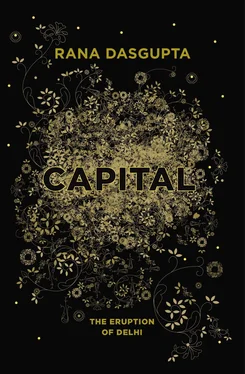That was a lot of money. I argued that it was disproportionate to the loss he might have incurred.
“This is not about loss. It is about insult.”
I said I was sorry that he took it that way, and asked if we could work out some kind of compromise.
“Mr Dasgupta, you will find that it is against Indian law to stop a cheque without informing the other party first. Of course it is up to you what you pay me. I will only say that I play golf at the Delhi Golf Club every morning with the country’s most powerful lawyers and judges, and I can make it impossible for you to live and work in this city. You are a foreigner, after all.”
And he added,
“I am not threatening you. I am just letting you know.”
I sought legal advice. The lawyer I spoke to advised me to give him what he asked for. Stopping a cheque in such circumstances was indeed prohibited. “And a man like that can ruin your life.”
The landlord called me about ten times that day. He was frantic at the slight he had received, and could not leave the issue alone. He threatened me, he cajoled me. He appealed to my sense of honour.
When I arrived at his place with my cheque book, he suddenly relaxed. He was jubilant, even. I gave him a cheque. He took a long time writing me a receipt so he could educate me about life.
“There are two important things to remember. Patriotism, which I learned from the navy. And honesty, which I learned from business. If you are not honest, you will never get anywhere.”
He handed me back my original cheque.
“I will keep an eye on your bank account. There is nothing you will do in this city that I will not know about.”
His was one of those large Delhi fortunes that are built up discreetly on the basis of reputation and personal affinities. One of the ways that such things are maintained is that the smallest slight on your reputation is immediately stamped out and punished. You do not let it stand.
• • •
There is admiration, in contemporary fashion, for the smooth mind: the mind without ‘issues’ that is ‘comfortable with itself’. True strength, it is thought, originates in minds like this; the work of becoming strong consists, therefore, in that kind of mental ironing we call therapy.
According to this, Delhi, with its jagged history and unresolved pain, should have been a place of weakness. Those who visited the city in the early twenty-first century, however, were struck in the opposite way: they were astonished at the confidence and ambition of its people. This is because ‘resolving’ trauma is not the only way to prevent it from incapacitating you. You can also use its energy to fuel an entirely different, and far more vigorous, response. You can become — since all of history, since all the world, is a battlefield — a warrior.
This was the way that many people, especially businesspeople, chose to see themselves after the partition; and the free-for-all of liberalisation only served to deepen the need for martial resolve. While most businesspeople in the West considered themselves to be civilians, their counterparts entering the global system in this place — and others like it — thought of themselves as soldiers. To others, they sometimes seemed to be unprincipled — to care little for the rules of society at large, for instance, or for those more vulnerable than themselves — but that was not their own conception of things. Of course they did not concern themselves with civilian considerations, for the warrior’s vocation required them to soar above them. But like all warriors they operated, in fact, according to a strong code of ethics. Their operating unit was the family, and sustaining this as an effective martial force required wisdom, rectitude and sacrifice.
The people of this part of the world, as we have seen, were always tough, self-reliant and prepared for adversity. Partition did not crush this spirit; it only confirmed its premise. Everything can be taken away. Property and money had disappeared, which was the perennial fate of wealth, so Punjabis took up arms against ill-fortune and started to make everything back again. And in Delhi, which acquired a million new citizens immediately after the partition, there were commercial opportunities galore.
Entrepreneurs had enjoyed little visibility in the newly independent India. The ‘good citizens’ were its farmers, soldiers and workers and those professionals who served the nation as teachers, doctors, engineers and bureaucrats. But for the global economy of the future, perhaps, it was those who operated in a permanent state of exception — its entrepreneurial warriors — whose activities were the most significant.
• • •
When I show up to meet Rahul Kapoor, 30I find that he is out at the gym. His grandfather, however, is at home, and he is delighted to have someone to whom he can show off the work that has just been completed in his bathroom. The room has been extended into the garden, so that it is now sunlit from three sides and very long. He raps his knuckles against the walls of the original part. “You see this? Italian marble.” Then he walks into the extension and knocks again. The sound is hollow. “And this new section is just plasterboard which has been painted to look like Italian marble. Can you tell the difference?”
He laughs delightedly.
“Why don’t you come into my study?” he says.
Somewhere above eighty years old, he is spectacularly sturdy and walks without impediment. He leads me into a small room flooded with daylight, where he bids me sit down. He does so himself, in a leather armchair, dons glasses, and presses the buttons of a mobile phone. I look around me at the silver-framed photographs of his grown-up grandchildren, who are all, men and women, strikingly attractive. In the middle of the room is a novelty table with a vast stone book for one of its legs. There is a large oil painting of village women on one wall and a sculpture of Ganesh on the other; above us is a chandelier decorated with glass roses.
“Hello, my dear,” he says into the phone. “I am chatting with a very nice man who has come to see Rahul. Do you know when he will be back? He doesn’t have his phone with him. Is that right? Wonderful. Thank you, my darling. I will see you soon. Very soon.”
He turns to me.
“He’ll be back any minute. Why don’t you have some tea or coffee in the meantime?”
He presses a button and a servant appears, to whom my order is precisely transmitted.
“You must meet my wife. She was one of the most beautiful women in the city. I had to chase her for years. Because I wasn’t a handsome man. Even now she is very beautiful.”
I find myself thinking, as I have thought before, that men from this generation, the men who were adult before the partition, seem able to love women more fully than their sons and grandsons.
“And she is the greatest hostess. While you are discussing something, she will bring out fifty different plates of snacks. And the best thing is, she will take plates for all the drivers also. With all this construction work in the house, she always makes sure the workers have a meal and a cold drink.”
Mr Kapoor is full of his wife. He is full of everything, in fact: he is happy to be alive.
He tells me about the young people in the photographs. Some are in London, some in California. Some are working in the family business in Delhi.
“My grandchildren still want to go on holiday with me,” he chuckles. “That makes me proud. Love is the most important thing. No matter how hard I was working, I always spent time with my children in the evenings.”
I ask him what he tries to pass on to his grandchildren.
“I teach them what goodness is. How to treat people. I know the richest men in town. But I’ve looked after everybody. And one thing I’m very proud of is that no one who has walked into my room looking for help has ever gone away disappointed. These blessings come back to you.”
Читать дальше











